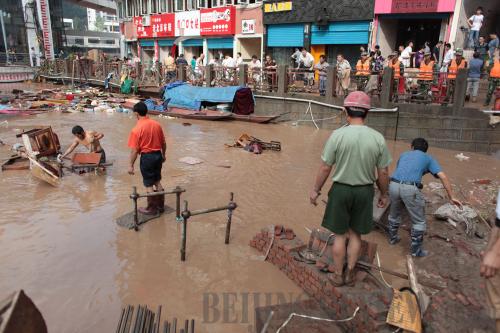|
 |
|
AFTER THE RAIN: Local residents in Dazhou, Sichuan Province, attempt to retrieve their belongings—washed away by a recent flood—after the waters retreated on July 19 (JIANG HONGJING) |
Rigged Opinion
A hearing was recently held on the price of admission to Pingyao ancient city in Shanxi Province, which has been named a World Cultural Heritage site by UNESCO. The admission price is to be raised from 100 yuan ($14.70) to 125 yuan ($18.40). Of the 25 participants speaking at the hearing, 24 agreed to the increase and four of them said they believed 125 yuan was still too cheap.
The hearing was attended by a total of 27 participants, comprising 14 people representing consumers, two representatives of operators of the scenic site, two representatives of parties who had declared an interest, seven local government officials and two specially invited academicians.
It's not surprising government officials, the academicians and representatives of parties of interest supported the price hike. Recent media reports said in 2009, Pingyao admitted free more than 100,000 visitors allegedly for business purposes. The waived admission fare exceeded 12 million yuan ($1.76 million). People who received the preferential treatment included government officials, celebrities and business partners.
As for those consumer representatives, most of them are from local government departments and companies, so they may well be among the ones who enjoy free admission.
When a hearing can't ensure the independence and fairness of participants, the result is almost meaningless. Why do we waste time and energy holding such hearings?
Qilu Evening News
Pretty Face, Ugly Inside
This summer, several rounds of heavy rain almost submerged 12 cities in south China. In June, Baise in Guangxi Zhuang Autonomous Region was totally cut off from the outside world because of flooding.
When unexpected downpours frequently turn cities into lakes, we can't help asking what's wrong with these cities? The problem can be attributed partly to natural reasons such as areas called heat islands where city areas are significantly warmer than surrounding rural areas. What we need to stress is human-related reasons, particularly short-sighted municipal planning, are more blameworthy.
Nowadays, many Chinese cities are carrying on with ambitious dreams of building internationally advanced metropolises. However, most people pay attention to only the appearance of a city. They seldom focus on those important but easily neglected municipal facilities that do not add to a city's shining appearance, such as underground drainage systems.
In the face of increasingly serious and frequent waterlogging, city administrators should start to ponder their mistakes. If they still turn a blind eye to underdeveloped drainage systems, maybe it's time to connect these systems' working to the officials' performance appraisals.
Beijing Times
Too Early to Celebrate
A recent report on Beijing's population composition says its "middle class" makes up more than 40 percent of the city's permanent population. Euromonitor International, a consulting company, also predicted China's rapid economic development would increase its "middle-class" population to 700 million by 2020.
It sounds great but the reality for Beijing's "middle class" is bleak.
The report claims average monthly salary for a member of Beijing's "middle class" is 5,923 yuan ($871) and a "middle-class" family's income monthly income is 10,008 yuan ($1,472). What kind of life can a "middle-class" person have on such an income? First of all, tax cuts into the salary; and then come housing rent, food and traveling costs. If you have a home or car mortgage to pay off, whether a 6,000-yuan ($882) income will support you or not is questionable. If there is a child, life will become even harder.
Most of the so-called "middle class" in Beijing are home mortgage slaves. On average they have to work hard for 25 years to afford a 90-square-meter apartment, currently worth about 1.6 million yuan ($235,000). Living in an underdeveloped social security system, an unexpected disease or other emergencies may easily drag a "middle-class" family down.
Given the struggling living conditions of China's so-called "middle class," it's not time to lose our heads but we need to stay alert and do more to create a "middle class" in a real sense.
Daily Sunshine
Swindling Tutors
In east China's Hangzhou, Zhejiang Province, a woman spent 20,000 yuan ($2,940) on her child's tutoring but the child still failed to pass the college entrance examination, registering such a low score even the worst school would not take him. The tutors who taught this child could be called swindlers.
Parents always hope their children—facing fierce school competition—will be able to learn more, so they arrange tutors for them. Sometimes, parents don't know whether their children need a tutor or what kind of tutors they should have, but when they see other children taking extra classes with tutors, they think their children need them too.
Whether tutoring is helpful or not is hard to tell. In most cases, if students get high scores, it's attributed to tutors' work; if children are still doing awful work, it's blamed on their incapacity or other reasons.
When a child meets a swindling tutor, the parents will lose money while the child will lose precious opportunities to move forward.
There is still no agency that regulates tutoring and cram schools. Education authorities should do something to help—punishing ineffectual tutors and creating high-quality tutoring service institutions to meet the demand.
Qianjiang Evening News | 